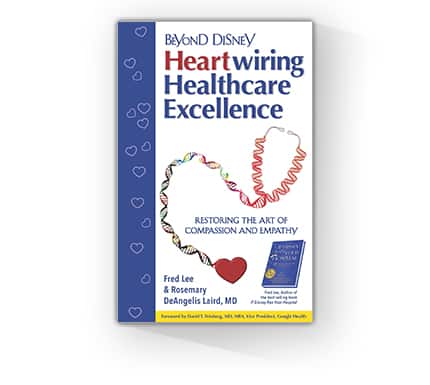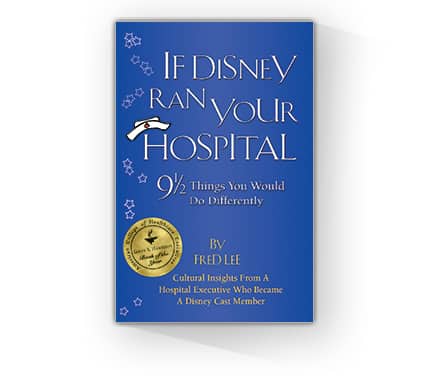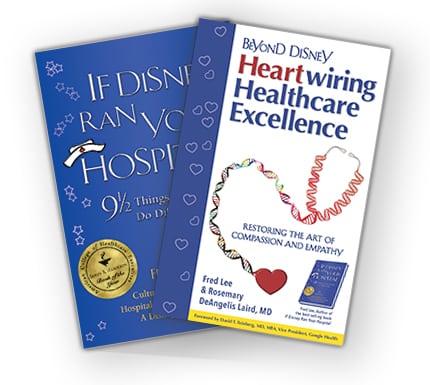
Available in
Hardcover: $38.00
Paperback: $28.00

Available in
Hardcover: $37.00
Paperback: $27.00

Available in
Hardcover: $75.00
Paperback: $55.00
“I still remember the first time I read Fred Lee’s If Disney Ran Your Hospital: 9 1/2 Things You Would Do Differently. It was 2007. I was stepping into the role of interim CEO of UCLA Health, and thinking about what it meant to deliver care that truly puts patients first. At the time, UCLA was renowned for its world-class physicians – but was ranked in the 38th percentile for patient satisfaction among US hospitals. Something was seriously wrong.
Fred’s book resonated with me, reinforcing what I’d learned during my years as a child and adolescent psychiatrist: You have to treat patients like people with real lives, not just case files. You need to provide for the whole person, giving them engaging, compassionate—and yes, even delightful—experiences. Top-notch care alone isn’t enough to help people heal and move forward. And when you treat your patients that way, you offer better, more personalized care, as well. Everybody wins.
At UCLA Health we set about establishing a “one patient at a time” approach and updated our mission statement to focus on “Healing humankind, one patient at a time, by alleviating suffering, promoting health, and delivering acts of kindness.” We really lived that mission, too. That’s how we rose to the 99th percentile in patient satisfaction, becoming the nation’s most-recommended hospital. And we got there by simply shifting our way of thinking: Instead of worrying about the numbers, we said, “Let’s do what’s right for the patient.”
Some of our approach was Disney-esque, but it was the little things we did — things that other hospitals weren’t doing — that made the biggest difference. For instance, we introduced ourselves to each patient, and told them what we were doing (and going to do) every step of the way. We explained everything in relatable human, not clinical, terms.
We even huddled our housekeeping staff nightly and shared fun facts like “Today is the 70th anniversary of Little League.” Why? Because we wanted them to go into patient rooms, introduce themselves, and say, “Is there a part of the room you want me to clean that needs special attention? Oh, and by the way, did you know that today is the 70th anniversary of Little League?” Simple facts like that started conversations that fostered meaningful relationships between our staff and patients.
Which is why, when I picked up Fred’s book in 2007 just as I was embarking on my transition at UCLA, I realized, “Yeah, this is exactly the same journey that we’re on.”
Fred began working on the book that you hold in your hands (or in your e-reader) before his death in 2017; it was completed by his exceptional collaborator, Dr. Rosemary DeAngelis Laird. Beyond Disney: Heartwiring Healthcare Excellence expands upon the principles in Fred’s first book and takes a closer look at the role of compassion, empathy, and the mind-body connection in healing.
The essence of the book is about shifting from our current “hardwired” standard of clinical care to a more human and holistic “heartwired” approach. As noted in the introduction, “To be heartwired is to know and use the patient’s story to provide quality care with genuine compassion and empathy.” This message — and this book — couldn’t come at a more critical time. As we face unprecedented challenges that risk overwhelming our global healthcare systems, it’s more important than ever to reflect on how we care for people, not just patients.
The message of Beyond Disney – Heartwiring Healthcare Excellence is deceptively simple: By connecting deeply with patients through compassion and empathy, we empower them to heal themselves in partnership with their caregivers. This isn’t just about improving customer service or the patient experience — it’s about reinventing healthcare so that it’s human-centered, driven by compassion, and shaped by our shared experiences on this earth. It’s also about how the power of imagination and belief in our innate ability to heal can save lives.
I now write this foreword while leading Google Health, where I have the opportunity to scale the delivery of authoritative information to millions of people and build tools for people to help them live healthier and happier lives. While our impact is driven by the incredible power of technology such as artificial intelligence, the same people-first approach still applies. At Google, respect for the user is our number-one value. That same focus drove the fundamental shift we made at UCLA, and that Fred so eloquently espoused in his first book, and now in his last.
Even as we strive to do the right thing, we can’t claim that the job is finished. Because, if we really cared for the whole person, healthcare would be affordable, it would be understandable, it would be accessible. It would be culturally dignified and sensitive, and it would be universal. Everybody should get the right kind of healthcare, not just what’s best for the healthcare provider or system. And that’s at the heart of this book’s message as well: Treat people as human beings (not numbers) and connect. Simply and truly connect.”
David T. Feinberg, MD
Vice President
Google Health
Mountain View, California
Former President & CEO
Geisinger Health System
Danville, Pennsylvania
Former President & CEO
UCLA Health
Los Angeles, California